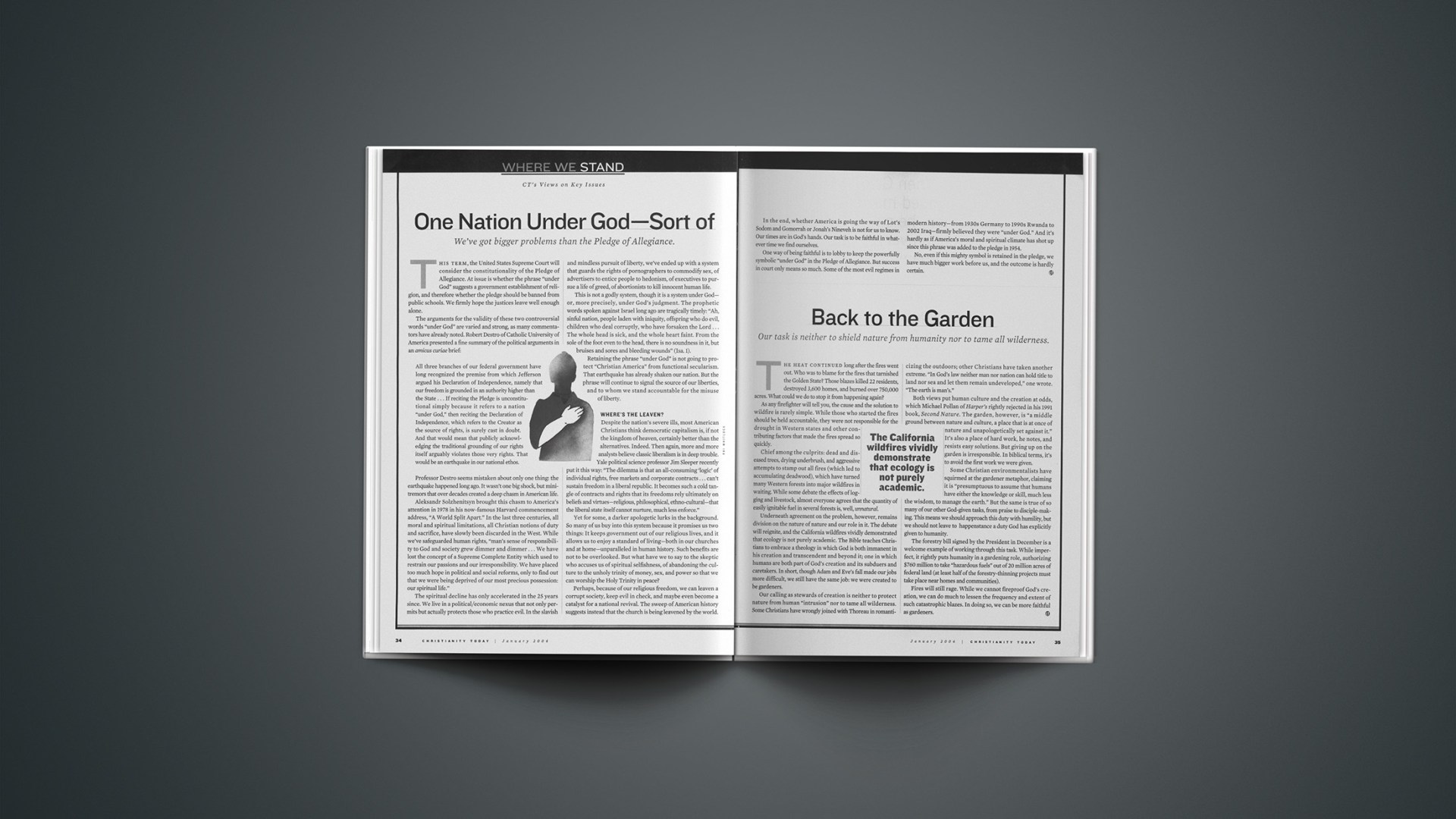The heat continued long after the fires went out. Who was to blame for the fires that tarnished the Golden State? Those blazes killed 22 residents, destroyed 3,600 homes, and burned over 750,000 acres. What could we do to stop it from happening again?
As any firefighter will tell you, the cause and the solution to wildfire is rarely simple. While those who started the fires should be held accountable, they were not responsible for the drought in Western states and other contributing factors that made the fires spread so quickly.
Chief among the culprits: dead and diseased trees, drying underbrush, and aggressive attempts to stamp out all fires (which led to accumulating deadwood), which have turned many Western forests into major wildfires in waiting. While some debate the effects of logging and livestock, almost everyone agrees that the quantity of easily ignitable fuel in several forests is, well, unnatural.
Underneath agreement on the problem, however, remains division on the nature of nature and our role in it. The debate will reignite, and the California wildfires vividly demonstrated that ecology is not purely academic. The Bible teaches Christians to embrace a theology in which God is both immanent in his creation and transcendent and beyond it; one in which humans are both part of God’s creation and its subduers and caretakers. In short, though Adam and Eve’s fall made our jobs more difficult, we still have the same job: we were created to be gardeners.
Our calling as stewards of creation is neither to protect nature from human “intrusion” nor to tame all wilderness. Some Christians have wrongly joined with Thoreau in romanticizing the outdoors; other Christians have taken another extreme. “In God’s law neither man nor nation can hold title to land nor sea and let them remain undeveloped,” one wrote. “The earth is man’s.”
Both views put human culture and the creation at odds, which Michael Pollan of Harper’s rightly rejected in his 1991 book, Second Nature. The garden, however, is “a middle ground between nature and culture, a place that is at once of nature and unapologetically set against it.” It’s also a place of hard work, he notes, and resists easy solutions. But giving up on the garden is irresponsible. In biblical terms, it’s to avoid the first work we were given.
Some Christian environmentalists have squirmed at the gardener metaphor, claiming it is “presumptuous to assume that humans have either the knowledge or skill, much less the wisdom, to manage the earth.” But the same is true of so many of our other God-given tasks, from praise to disciple-making. This means we should approach this duty with humility, but we should not leave to happenstance a duty God has explicitly given to humanity.
The forestry bill signed by the President in December is a welcome example of working through this task. While imperfect, it rightly puts humanity in a gardening role, authorizing $760 million to take “hazardous fuels” out of 20 million acres of federal land (at least half of the forestry-thinning projects must take place near homes and communities).
Fires will still rage. While we cannot fireproof God’s creation, we can do much to lessen the frequency and extent of such catastrophic blazes. In doing so, we can be more faithful as gardeners.
Copyright © 2004 Christianity Today. Click for reprint information.
Related Elsewhere:
Other Christianity Today articles on environmentalism include:
Eco-Myths | Don’t believe everything you hear about the church and the environmental crisis. (June 27 2001)
Why We Love the Earth | Our belief in a Creator, not crisis scenarios, drives our environmental concerns. (June 27 2001)
Bald Eagles and Babies | The case for compassionate conservationism. (June 27 2001)
Religious Leaders Rebuke Bush Administration Over Kyoto Protocol | Officials from the National Council of Churches, Presbyterian Church (USA), United Methodist Church, Disciples of Christ, and African Methodist Episcopal Church say U.S. must limit greenhouse gas emissions. (April 6, 2001)
Unholy Harvest? | Evangelicals join protests against genetically modified “frankenfoods.” (May 9, 2000)
U.S. Churches Join Global Warming Debate (Oct. 5, 1998)
God’s Green Acres | How Calvin DeWitt is helping Dunn, Wisconsin, reflect the glory of God’s good creation. (June 15, 1998)
Greening of the Gospel? | Evangelical environmentalists press to add creation care to the church’s mission. (Nov. 11, 1996)
Evangelical Environmentalism Comes of Age (Nov. 11, 1996)










